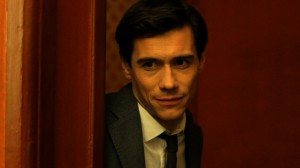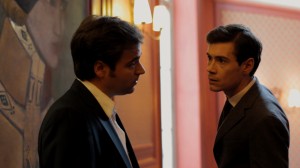‘The Screen Illusion’ is effective, but lacking in resonance

Mathieu Amalric’s The Screen Illusion is a lot better than most modern-day adaptations of classic texts. In the 88-minute feature, which will be presented as part of the Rendez-vous with French Cinema Festival in New York City, Clindor (Loïc Corbery) is estranged from his father Pridamant (Alain Lenglet). The son lives a varied life of sexual liaisons with several women, while his father contracts a detective/concierge (Hervé Pierre) to turn up evidence of what Clindor has been up to the past decade.
Classicists will most identify with The Screen Illusion (L’illusion Comique) because it uses all of its dialogue from the original Pierre Corneille play. The experimental movie is part of a larger initiative to give filmmakers an opportunity to adapt classic French texts for the cinematic form. The obstacles are challenging: They need to make the movie in no more than 12 days, utilizing actors from the famed La Comédie-Française. The resulting film, considering the circumstances, is inspired and slick.
But the entire project begs the question: Why? With a little more care and thought, The Screen Illusion could have been even better. The current film, which was broadcast on French television, feels rushed and at times even juvenile. Simply moving from stage to screen doesn’t work; there needs to be a careful process of adaptation, cutting scenes that would work well in a theater setting and expanding others that blossom in a cinema. There’s not much subtlety here. Amalric has a few ideas (Pierre’s Alcandre is no longer a wizard in a cave, but a slimy concierge at a posh Paris hotel), but the exercise feels constrained and slight. At only 88 minutes, a piece of comedy/drama that should resonate only feels fleeting.

The acting is nicely handled by the ensemble. Corbery is the centering point here, the one character who needs to bounce off the rest of the cast. His dealings with his mistresses are comedic in nature, but also romantically dramatic. He’s obviously lost in the world, a young man fetching dreams of monetary value. Lenglet, who watches his son from afar, is also quite skilled, displaying a steely determination for reconnecting with Clindor.
Suliane Brahim is pitch-perfect as Isabelle, the ultimate girl of Clindor’s fantasies. There’s one scene where she unleashes her fury in a parking garage, and the visceral energy of her performance is palpable.
Pierre is the best, mostly because his role is so colorful. Each character speaks in verse, and at first this sounds jarring. But for some reason, Pierre’s Alcandre fits right in. He keeps a public image as the concierge and then invites Pridamant into his secret “cave” of security equipment where he watches the goings-on of his hotel like a pornographer. A man like that could only talk with a witty charm.
Although the central conceit of The Screen Illusion is somewhat silly, Amalric films the hotel setting and a nearby club with an expert’s eye. He likes to get close to his subjects, letting them live in front of the camera and never get away from the scrutiny.
The plotting, especially given the updating of the scenery, is scatterbrain. At times it’s difficult to understand how everyone is connected, and this is compounded by the fact that they’re all talking in dated language. There are many cries of “arduous love” and “pain” and “love forsaken.” Thankfully, all of the actors keep a straight face, and after a while, one gets used to the unusual presentation.
The ultimate question returns: Why? Does this adaptation build upon Corneille’s original? Do we experience something different or deeper when these old words are given a modern-day treatment?
In terms of profundity, the answer is unfortunately no. Much like the characters in The Screen Illusion, the emotion is only skin deep. But there’s still something to be said for an experiment gone wrong; in its shortcomings, there’s a lot to appreciate.
By John Soltes / Publisher / John@HollywoodSoapbox.com
-
The Screen Illusion
-
In French, with English subtitles
-
2012
-
Directed by Mathieu Amalric
-
Adapted from a play by Pierre Corneille
-
Starring Muriel Mayette, Denis Podalydès, Suliane Brahim, Loïc Corbery, Hervé Pierre and Alain Lenglet
-
Running time: 88 minutes
-
Playing as part of the Rendez-vous with French Cinema Festival in New York City. Click here for more information.
-
Rating:





